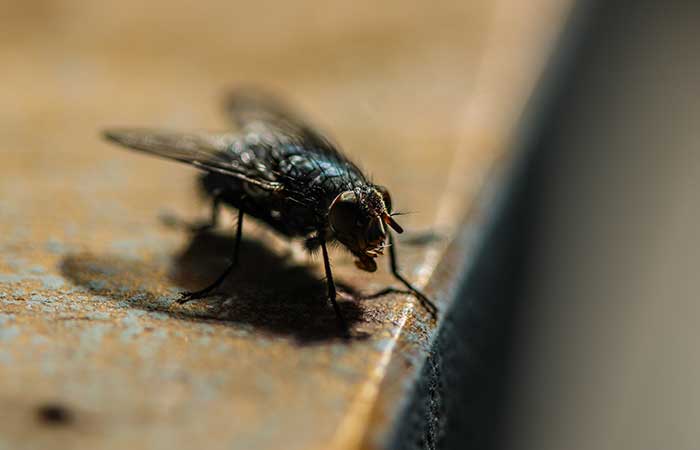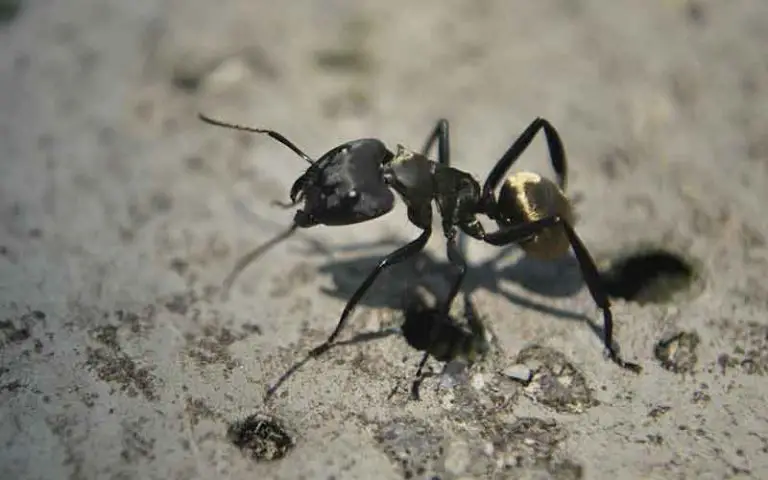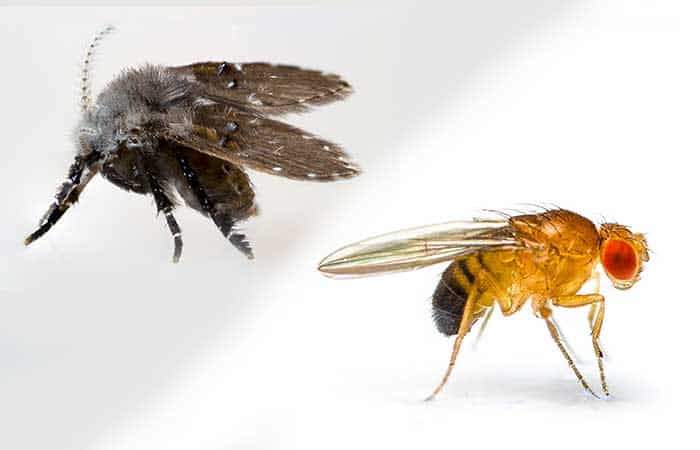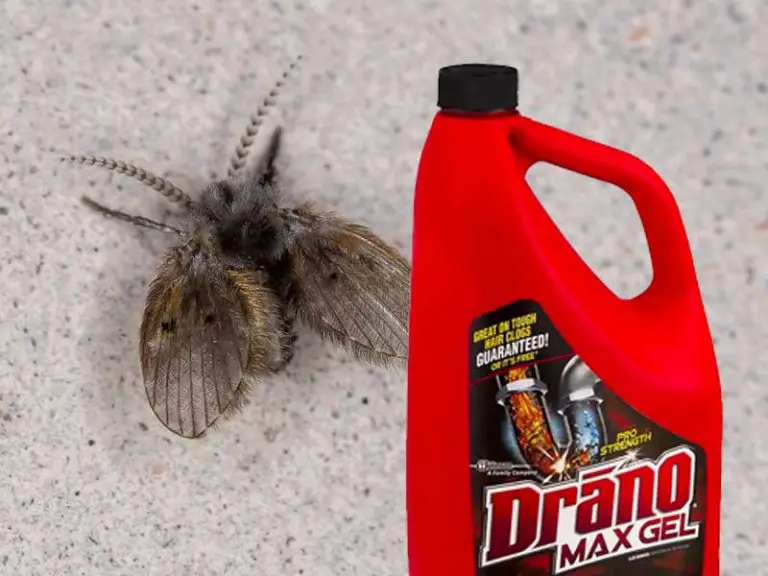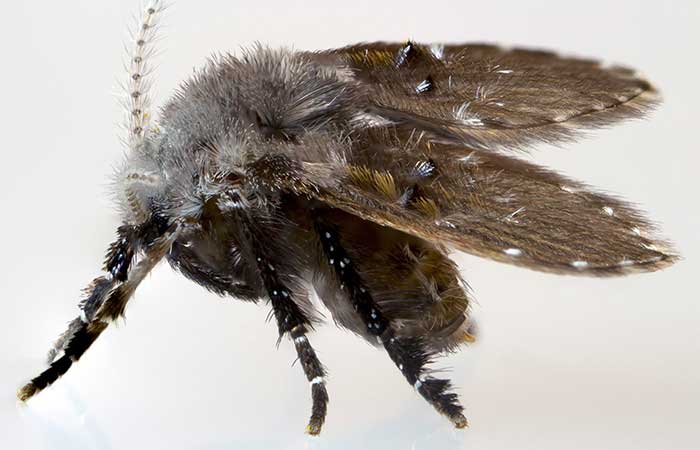Tiny Black Flies in Refrigerator or Freezer? How To Get Rid
From time to time, you will experience the presence of tiny black flies in your refrigerator or freezer. These flies are almost always going to be identified as fruit flies or gnats. The larvae of these flies feed on organic materials that contain yeast; they naturally occur in many foods such as cheese and fermenting fruit and vegetables.
Fruit fly and gnats adults can survive several days without food but only a few hours without water. They also can’t withstand extreme cold. This explains why the flies only live in the refrigerator for a short period of time and do not usually go into areas that are well ventilated.
What Are These Tiny Dead Bugs Fruit Flies or Gnats?
Fruit flies or gnats are often found in kitchens or pantries, especially if there is any fermenting fruit or vegetables nearby.
While they are annoying to have around, the damage these bugs cause to food is actually relatively minimal. The adults do not bite, but their larvae can be a nuisance for eating spoiled food. Also, as they develop and feed, fruit fly maggots can cause extensive damage to the food where they are living.
Fruit flies or gnats normally lay eggs in decaying or fermenting matter such as overripe fruits, vegetables, and even beer and wine. Flies will rapidly begin to appear once this begins to happen and it is important to take care of the problem quickly as their numbers can grow exponentially.
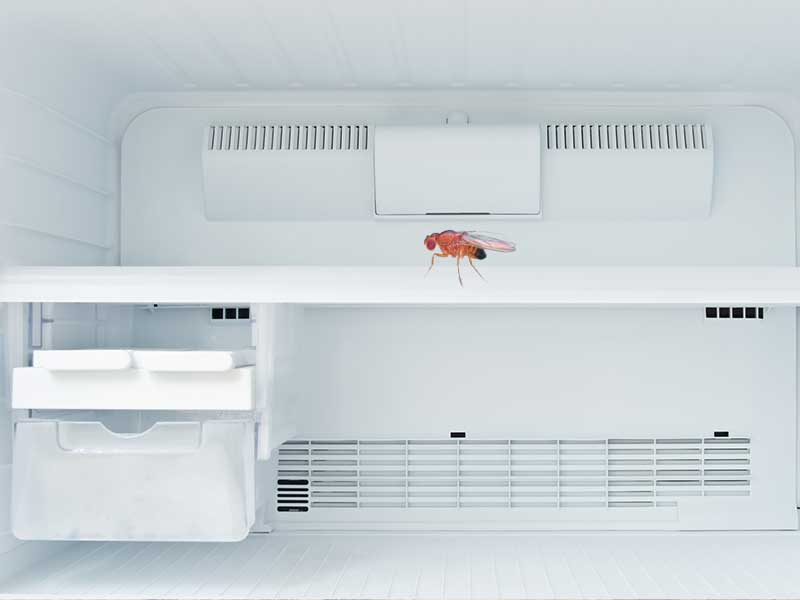
The first thing to determine is whether these are fruit flies or gnats. These two insects are very similar in appearance and behavior, but their lifespan varies. Fruit flies live for about two weeks, whereas gnats can live for up to a month.
If you are unsure of what type of fly you are dealing with, take a closer look at the larvae. Fruit fly larvae are white with a black head, whereas the gnat larvae are clear with a shiny black head. If you can’t determine the species from just the larvae, try to find an adult specimen. Adult fruit flies have red eyes and a dark spot on their thorax, whereas adult gnats have brown eyes and no spots.
How do fruit flies and gnats enter the refrigerator and freezer?
Before they are able to lay eggs, the flies need access to food. Frequently, they find their way into refrigerators or freezers by hitching a ride with some type of food that doesn’t fit tightly in the packaging or is not stored correctly.
If you have recently purchased produce, it is very likely that there were some fruit flies or gnats on it. The eggs are very small and can be difficult to see with the naked eye, so even if you washed the produce thoroughly, some eggs may have still been left behind.
Fruit flies and gnats can also enter a refrigerator or freezer through a number of different entry points. Any crack, crevice, seam, or opening in the insulation, door gasket, or door will allow access to these pests.
It’s also possible that the gaps in your fridge are too large. If the fridge door gaskets aren’t appropriately clogged, gnats will find a way to get through. There could also be clutter along the gasket that prevents the refrigerator door from shutting properly.
Can Fruit Flies Survive in The Fridge?
Fruit flies cannot survive in the fridge or the freezer. The flies die at temperatures below 53 degrees which means they might only survive up to 1 minute in the refrigerator. Fruit flies might sometimes risk dying to get in the fridge when there’s fermenting fruit inside to attract them.
Fruit flies eat and lay eggs in overripe fruit. Most fruits can go bad even in the fridge which means there’s a small chance fruit flies risk flying through low temperatures to get to the food if they can find the fridge door open.
How long does a fruit fly survive in a fridge or a freezer?
Fruit flies cannot survive in the refrigerator for more than 8 minutes. Most die sooner. However, the number of minutes it takes for these flies to die depends on the temperature settings of the refrigerator.
Most refrigerators come with standard 1-5 or 1-6 cooling increments. These represent temperature settings of up to 40°F, as recommended by the Food and Drugs Administration (FDA).
Low-temperature settings
Low-temperature settings of around 32°F are rare in modern refrigerators. These low temperatures are mostly tied to the meat compartments of the refrigerator or they can be seen in freezers.
Fruit flies survive up to 1 minute in low-temperature settings that don’t exceed 32°F. These flies cannot eat or lay eggs at such low temperatures.
Average temperature settings
The average refrigerator temperature of around 40°F is common for most refrigerators in standard settings. Fruit flies can only survive up to a couple of minutes in these temperature settings which are highly common for the average refrigerator.
High-temperature settings
Some areas of the refrigerator run at higher temperatures as cooling at the lowest temperatures aren’t needed. Modern refrigerators cool fruits and vegetable areas of the refrigerator at 50°F for energy efficiency and because fruits and vegetables don’t need chilling at or near the freezing temperature.
Fruit flies can survive up to 8 minutes in high-temperature settings. These temperature settings are only common in the fruit and vegetable sections of modern refrigerators and not in freezers.
Can Gnats Survive in The Fridge?
Gnats can survive in the refrigerator but not for very long. The cold temperatures slow down their metabolism so they need to eat less frequently, which means that their lifespan increases. However, because gnats also require water to survive, it is likely that they will eventually die if food sources are scarce and no water is available.
Fruit flies and gnats can survive in the refrigerator and freezer as long as there is food for them to feed on. However, once the inside of the appliance reaches 41 degrees F or below they will die. Therefore, the colder the appliance is, the less likely it is that you will have an infestation.
How To Get Rid Of Tiny Dead Flies In Fridge?
Whether you have fruit flies or gnats invading your fridge or freezer, the same steps apply to getting rid of them. If you’re not sure whether or not to get rid of the pests since they haven’t established themselves in your refrigerator yet, your best bet is to clean it thoroughly and follow these steps;
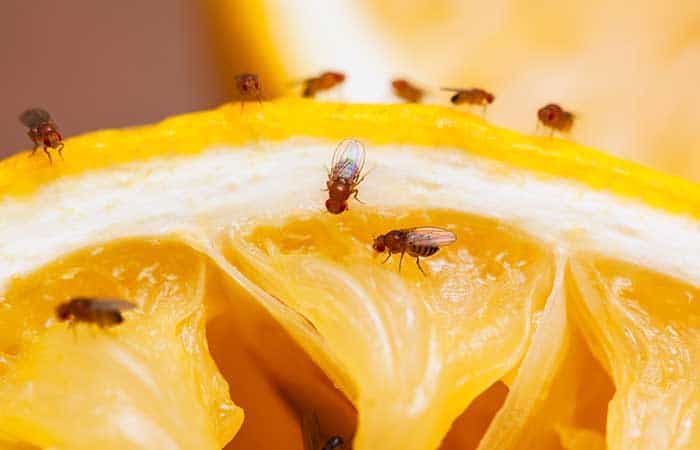
1. Remove all food
Remove all of the food from your refrigerator. If you haven’t cleaned out your fridge in a while, this would be an excellent time to do so.
This may be a way to pin down the origin of the infestation. Examine all of your meals, check the expiration date and inspect the food, removing any spoiled or rotting food.
2. Remove all of the shelves and drawers
Remove all of your shelves and drawers so that you can wash them thoroughly with warm soapy water afterward. Do not put them back until you have completed this step.
3. Thoroughly clean the walls, floor and ceiling of the fridge
Use warm soapy water to thoroughly clean the walls, floor, and ceiling of the refrigerator. Keep an eye out for the tight corners inside the fridge, where most dirt accumulates.
Dry thoroughly with paper towels or a towel.
If you are cleaning your freezer, you will need to defrost it first.
4. Dry out thoroughly
Make sure the inside of your refrigerator is completely dry before you put any shelves or drawers back in. This will help to prevent any future infestations.
5. Restock Your Refrigerator & Freezer
By this point, the pests should have been eradicated. You’ve gotten rid of any spoiled food, everything is neat and tidy, and things should be in good shape.
Place the healthy food on a counter or in your refrigerator. The same goes for your freezer. If you defrosted meat in the fridge and it’s been thawed, throw it out. You should never eat meat that has previously been frozen twice.
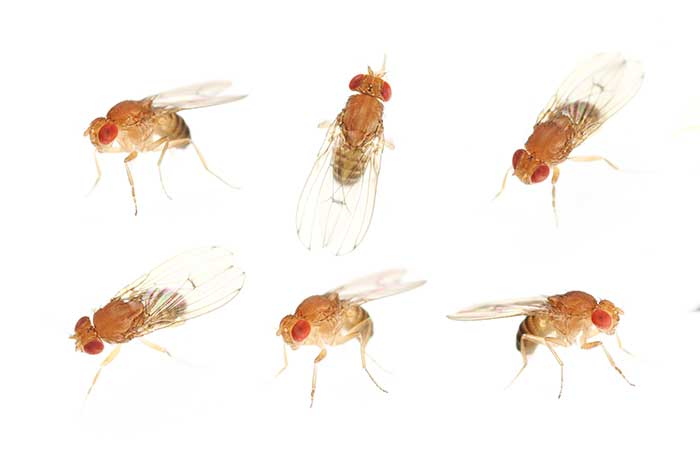
How To Prevent Flies From Returning
The reason these tiny black bugs have entered your fridge or freezer could be because of an underlying issue you have in your home that is attracting them.
The best form of defense against these pests is to ensure that you are not creating an environment that is appealing to them. This way they will not return to your fridge or freezer after you have thoroughly cleaned.
Clean And Unclog The Drains To Kill Flies
One of the most common ways to attract flies is through dirty and unclogged drains. If you have a problem with flies, it is important to clean your drains on a regular basis. You can do this using a simple mixture of vinegar and baking soda. Pour the mixture down the drain and let it sit for about 30 minutes before rinsing with warm water.
Store Food In Sealed Containers
Another way to keep flies away from your food is by storing it in sealed containers. Not only will this help to keep the pests out, but it will also help to preserve the freshness of your food.
Prevent Standing Water
It is crucial that you remove any sources of standing water. Any type of standing water will attract pests to your home. This includes pet bowls, flower vases, and old dishes in the sink. It also helps to keep things clean around your house since it eliminates many common breeding grounds for these insects. If there are any sources of standing water that you cannot get rid of, consider using a fly trap to catch them.
Clean Your Yard or Garden
One of the most effective ways to get rid of flies is by removing any opportunities for them to breed. This means you need to make sure there are no puddles or moist areas in your yard or garden where they can lay their larvae.
Clean Your Garbage Disposal Regularly
If you notice that there is a large number of flies in your kitchen, it might be a good idea to clean your garbage disposal. Food that is stuck inside the garbage disposal can attract pests. Make sure to clean it on a consistent basis.
Clean And Vacuum Regularly
Despite the fact that flies are attracted to dirty homes, you still need to make sure your house is kept clean on a regular basis. Make certain floors, countertops, and tabletops are swept and vacuumed on a regular basis. This will help to eliminate any food crumbs that might be attracting the pests.
Install Window Shields
If you have a fly problem, it might be a good idea to install window shields. Not only will they help to keep flies from entering your home, but they also allow the sunshine in. This is also a great choice for those who simply want to block out any noise that may be coming from outside.
Keep Sticky Fly Traps In Your Home
Another great way to prevent these black bugs from entering your home is by placing them in strategic areas. Sticky fly traps can be placed around doorways or windows to capture flies as they try to enter the house. They are not only effective, but they are also affordable.
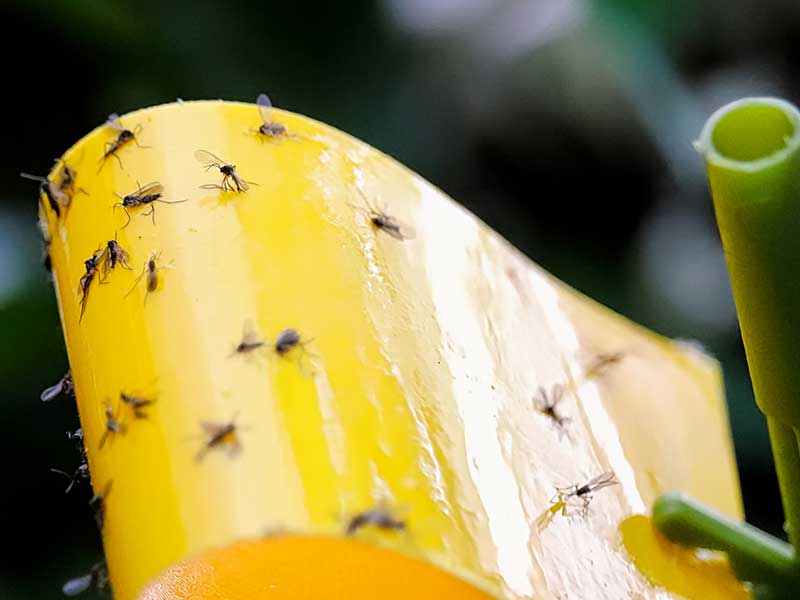
These simple steps should help you take back control of your home and keep these pests out.
Do These Tiny Bugs In Fridge Carry Any Diseases?
Dead fruit flies and gnats may seem harmless but they can be carriers of diseases. As a result, it is important to kill them as soon as possible by following the steps above. They do not bite humans or animals, but they can contaminate food with their feces. If ingested, these bacteria can cause food poisoning and other serious health problems.


